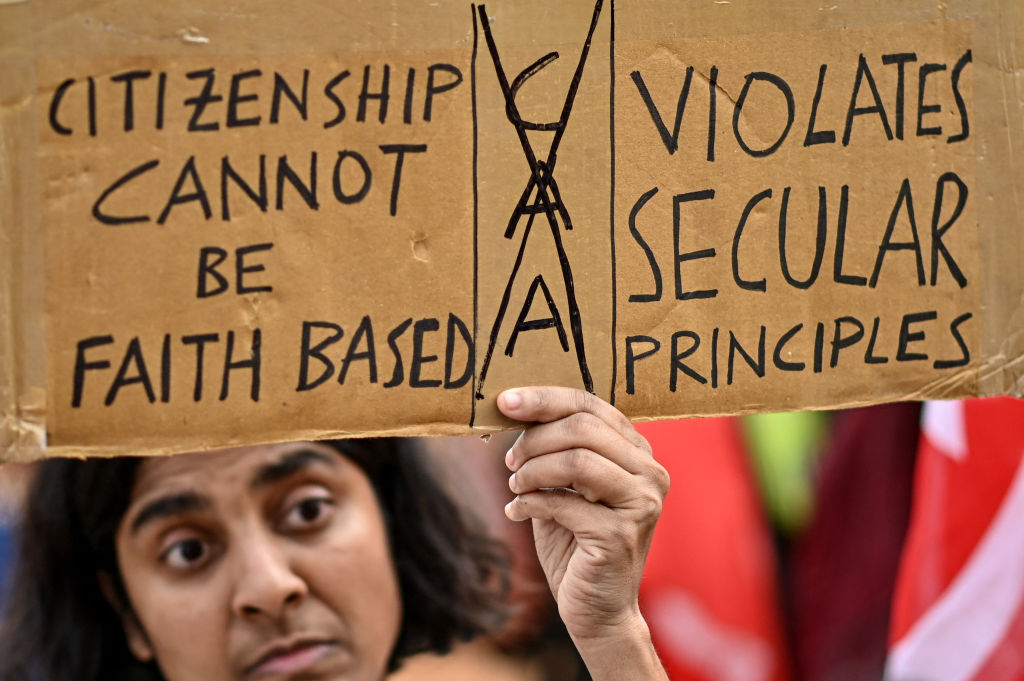- Friday, May 10, 2024
Rights groups alleged that the law ignores Muslim minority groups such as Shias from the Sunni-majority nations of Pakistan, Afghanistan and Bangladesh and also the Muslim Rohingyas in Myanmar.

By: Shubham Ghosh
THE United States and the United Nations have expressed concerns over the religion-based citizenship law that India’s Narendra Modi government implemented earlier this week, with the world body calling it “fundamentally discriminating in nature”.
Rights activists criticised the contentious Citizenship Amendment Act (CAA) which was passed in 2019 and aims to give Indian citizenship to non-Muslim minorities who face persecution in the Muslim-majority nations of Pakistan, Afghanistan and Bangladesh.
Human Rights Watch and Amnesty International even said that the law discriminates against Muslims, India’s minority community.
Read: India makes CAA law a reality: What’s CAA and who will be impacted?
Modi’s Bharatiya Janata Party (BJP), a Hindu nationalist outfit looking to secure its third consecutive term in office, has been pushing to implement the law and it was eventually implemented just weeks before the general elections of 2024.
Rights groups have alleged that the law excludes Muslim minority groups such as Shias from the three Muslim-majority nations besides overlooking other neighbouring countries of India where also the Muslims are a minority, such as the Rohingyas in Myanmar.
Read: India makes CAA, a citizenship law, reality 4 years after clearing bill
“As we said in 2019, we are concerned that India’s Citizenship (Amendment) Act 2019 (CAA) is fundamentally discriminatory in nature and in breach of India’s international human rights obligations,” a spokesperson of the Office of the United Nations High Commissioner for Human Rights said, Reuters reported.
He added that the office was seeing whether the law’s implementation rules are in sync with international human rights law.
The US, which has grown closer to India in recent years for strategic and economic reasons, also expressed reservations over the CAA.
“We are concerned about the notification of the Citizenship Amendment Act on March 11. We are closely monitoring how this act will be implemented,” a spokesperson of the US state department said separately.
“Respect for religious freedom and equal treatment under the law for all communities are fundamental democratic principles,” the spokesperson added in an email, Reuters added.
The rights activists feel that combined with a proposed National Register of Citizens, the CAA could lead to discrimination against India’s 200 million Muslims. Some are also apprehensive that the government might strip Muslims who live in the border areas and do not have any documents of their citizenship.
The Modi government, however, has said that the citizenship of Indian Muslims will not be affected by the law.
The government did not implement the law after it was passed in 2019 as protests and sectarian conflicts started in New Delhi and other parts in which many people were killed and others injured.
A number of states in India ruled by opposition parties have protested the CAA saying they would not allow it to be implemented on their soil. The government has dubbed the protests as politically motivated.
The Indian embassy in Washington on Wednesday (13) said the normal process of application for Indian citizenship remains available to all, regardless of nationality, community or faith, and that the CAA was meant specifically for “stateless persons from these persecuted communities who are already in India”.
While the Modi government has been accused of being anti-Muslims, it has denied the charges and said its policies aim to benefit all citizens of the country.
![]()